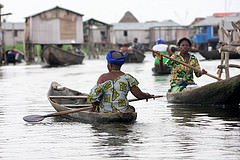MOTIVATION
The impact of climate change will be most severe in tropical countries, like many countries in Africa south of the Sahara—particularly in those that have scarce resources to channel into adaptation strategies, whose policy makers lack information, and where there is significant poverty. Even small climate changes can have a significant impact on farmers’ livelihoods and overall wellbeing. With support from the Federal Ministry for Economic Cooperation and Development (BMZ) and the CGIAR Research Program on Climate Change, Agriculture, and Food Security (CCAFS), IFPRI worked with the Association for Strengthening Agricultural Research in Eastern and Central Africa (ASARECA), the Food, Agriculture and Natural Resources Policy Analysis Network (FANRPAN), and other national partners to generate country-level analyses on climate change impacts and adaptation strategies for 10 countries in East Africa and 8 countries in southern Africa. IFPRI published the results in three books released in 2013: East African Agriculture and Climate Change: A Comprehensive Analysis, Southern African Agriculture and Climate Change: A Comprehensive Analysis, and West African Agriculture and Climate Change: A Comprehensive Analysis.
RESULTS
An in-depth look at the potential consequences of climate change on agriculture, food security, and resource management by 2050 was conducted using IFPRI’s innovative models. The research also offered recommendations such as incorporating adaptation strategies into long-term planning and developmental programs. Locally based collaborators interpreted the results, with some assistance from IFPRI, thereby facilitating the wide dissemination and uptake of the research findings.
OUTCOMES
- In 2014, the World Center for Sustainable Development (RIO+Centre) and FANRPAN partnered to establish a Community of Practice (CoP) for climate-smart agriculture (CSA) in eastern and southern Africa. The decision to do so was informed by research findings showing the necessity of capacity building in climate change knowledge to reduce the risks that communities in the region are facing.
- The South African Department of Environmental Affairs (DEA) used the scenarios that IFPRI developed to inform one of its analyses for the Long- Term Adaptation Scenarios (LTAS) Flagship Research Program, which conducts climate change adaptation research and scenario planning for South Africa and the southern African subregion. DEA praised IFPRI’s leadership in innovative research, noting that IFPRI "has conducted some of the most comprehensive regional and global studies on the possible impacts of climate change on agricultural production and food security."
For more information on IFPRI's partnerships with Germany, please go to this brochure.



